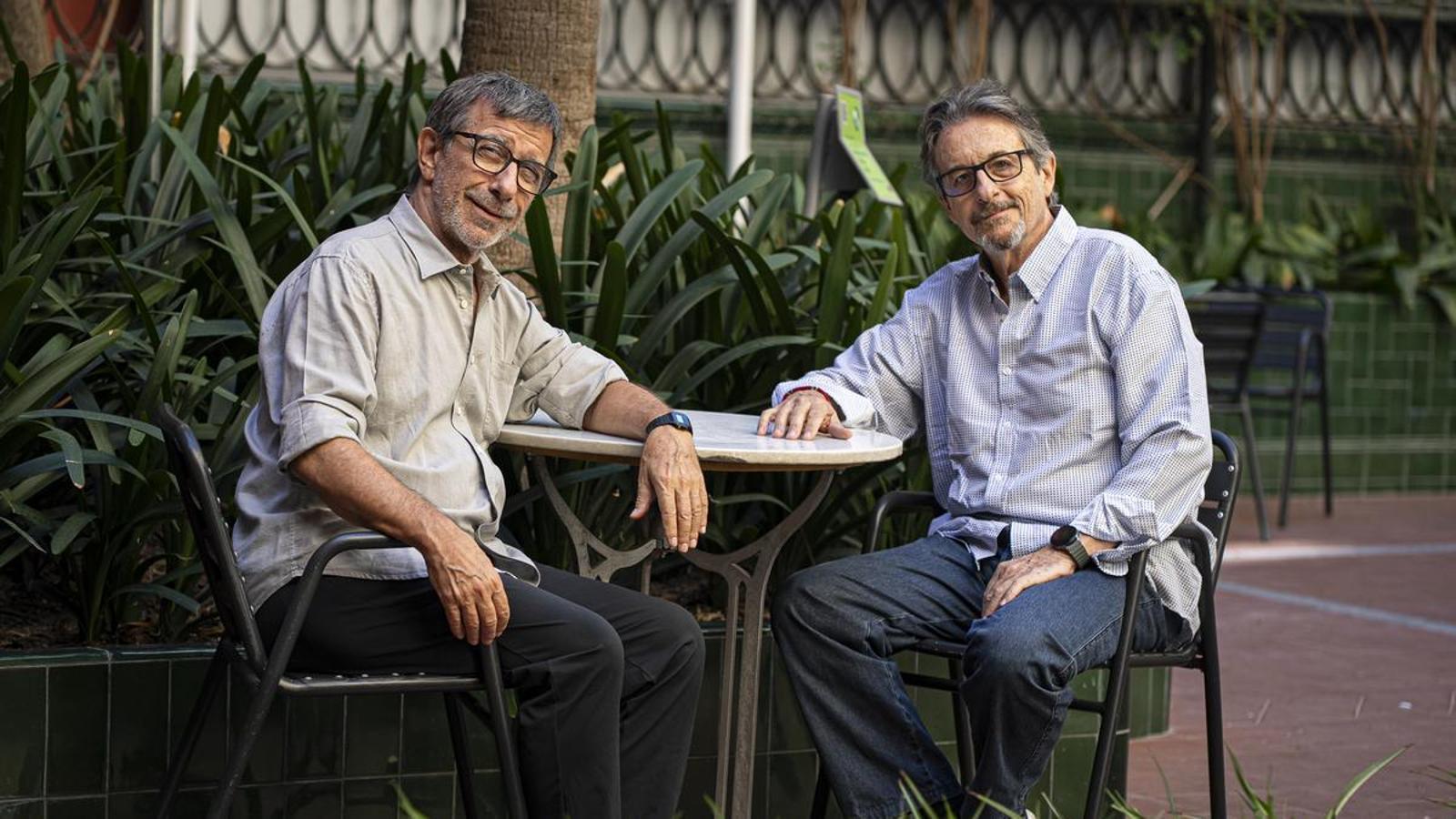Ramon Madaula i Jordi Boixaderas: "All friendships have rough spots"
Actors premiere 'Els bons' at the Poliorama Theater


BarcelonaRamon Madaula (Sabadell, 1962) and Jordi Boixaderas (Sabadell, 1959) share a hometown, a profession, and a generation. Performers with a very long career, their work has brought them together on several occasions, such as in the Catalan version ofA wild god (2010) or in the very popular TV3 series Ventdelplà (2005). This autumn, for the first time, they will go up together and alone on the stage of the Teatre Poliorama to perform The bonds, a comedy written by Madaula—who has been developing his playwriting skills over the last decade—and directed by Paco Mir. The show contrasts two friends, their good and bad behaviors, in a peculiar setting: the performance of the village Pastorets. The bonds It premieres on September 10th and arrives after a successful run in dozens of theaters throughout Catalonia.
Is it a show about kindness?
— Ramon Madaula: There's a phrase in the opening notes that says kindness is a handicap for success. I consider myself a good person, but over the years I've become coarse, cynical, distrustful. When you're good or innocent, you believe many things, but then life passes you by, you become disappointed, and you realize that kindness doesn't serve you professionally. On the contrary, sometimes it's an obstacle. From there comes this story of two good men, who as teenagers were pure, and life has coarsened them until they betrayed each other.
Do you see it that way too, Jordi?
— Jordi Boixaderas: Generally, no. I think a certain kind of bigness of heart is useful for life. But it's also risky. I've met very successful people who trust. Occasionally, someone screws you over, but generally, you have to trust people. It's true that in life, you start out more innocent than you become over time; you can't go in with a grain of salt.
But from the outside, you're both successful figures in the Catalan theater and audiovisual scene. How should we interpret this?
— RMYou consider us two successful men, but I consider us to have managed to float, which is already a lot. I don't think I've ever betrayed myself, or anyone else, to get here. But if at some point I had behaved less clearly, perhaps I would have been better off. You always have the faith that if you do things right, they'll call you, but sometimes that's not the case. You have to know how to sell yourself; you have to be a bit opportunistic.
The protagonists are two friends who were young and formed the Pastorets together. How did you meet?
— JBWe've never performed the Pastorets, but we watched them as children. We have the same Satan as a reference; in fact, we remember him and dedicate many performances to him. Ramon and I met while trying to create a municipal company in Sabadell. We've since met over time.
— RM: Yes, it was an attempt to create a professional company that was not successful, in the 80s. There was Rosa Renom, Anna Güell.
The protagonists are friends. How has the way we view friendship changed over time?
— RMFor me, friendship is a pending issue. I struggle to make and keep friends. I have many good acquaintances, but friendship is something I don't handle very well. And the older it gets, the worse it gets. My family absorbs me; I've become very locked away within the family environment. In the show, both characters are the only friend they have for each other because the people I know have very few friends.
— J:B.: What happens to both of them is that a role is established from the start, due to the situation in which they met, and it somehow haunts them. After a few years, when they're a little irritated, one tells the other that he's fed up with being considered his little brother.
— RMIn the end, all friendships have rough patches. They carry a heavy backpack and spill everything.
You have to play two characters who are experiencing their own misdeeds. How did you work on that?
— JBThere's this cliché that to play a character, you have to draw on your primal impulses, your sensory memory, and yourself. But our job is to create something magnetic and believable, and you can get there in 50 different ways. There's that story about Dustin Hoffman saying to Laurence Olivier, "To play this character, I had to get drunk." And the other guy says, "No, man, just fake it." I've met great actors and actresses who fake it, and others who have spent half a year getting into the role organically.
But isn't it more limiting if the work you do depends on what you've experienced?
— JBThere's a danger of losing control. Trying to get something out that worries you, concerns you, or amuses you can be helpful, but you should never lose the distance between yourself and the work you're doing. Otherwise, it's a scam, because people aren't coming to see your vomit; they're coming to see how you've been working, trying things out, making mistakes until you find the right balance and aesthetic sense.
— RM: I'm increasingly relying on what the other actor on stage provokes in you. It's a job we don't do alone. It's about throwing the ball well and getting it returned well. Otherwise, the ball falls, the profession is masturbatory and of no interest.
Jordi, there was a time when you retired from the stage. Now you've returned. Why?
— JBTheater completely disappeared from my life out of necessity, and over time I've seen that I did the right thing. I felt like I didn't like how I did it, that I was repeating myself and boring myself. In theater, if you don't have a little primal energy to go and sweat it out, it's very difficult to break free. And if it doesn't work out afterwards, the feeling is very unpleasant. It felt like a mountain to me.
Ramón, do you experience it like that too?
— RM: The responsibility as a playwright weighs heavily on me. Knowing that there are producers and actors who have trusted a product, who have put money out of their own pockets, and the numbers have to work. All of this isn't easy.
What has given you back your hope, Jordi?
— JBThe challenge of trying to delve deeper into the technique. When taking on projects, this is a requirement: the script must be good. In this case, I said yes because Ramón told me it would be him and me doing comedy, that we would do it with Guerrilla Produccions, who are fantastic, and that we would do shows around Catalonia, that we might not even go to Barcelona.
— RM: Opening Barcelona is very impressive, sometimes it's like walking into the lion's den.
Los bonos will inaugurate the new season at the Poliorama Theater, which is packed with new shows. One of the most notable productions is Glorious! , also directed by Paco Mir and starring Ramon Gener, Marta Ribera, and Santi Millán. The show revolves around Florence Foster Jenkins, known as the worst singer in the world, who filled Carnegie Hall in New York in the 1940s. David Selvas will lead the theatrical adaptation of Perfectos desconocidos (Perfect Strangers) with a cast full of familiar faces, including Eduard Farelo, Sara Espígul, and Sara Espígul. They will all play the roles of a group of friends who, during a dinner party, decide to expose their private lives by letting each other's cell phones be stolen. The Poliorama program also includes the return of La berrea del circo (The Deer's Bellow) by La Calórica and family shows such as Alan, the Musical and Hansel and Gretel, the Musical .
